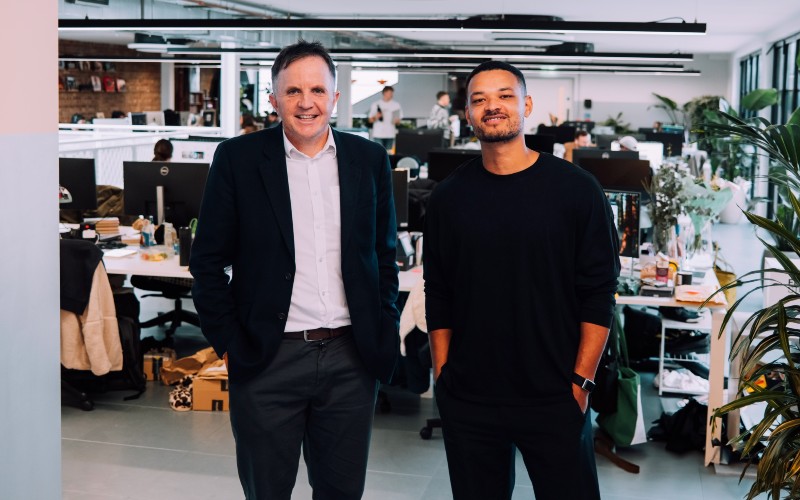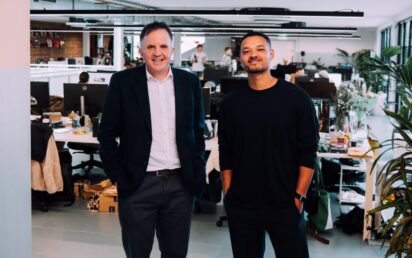Steven Bartlett can’t stop making headlines.
The Dragons’ Den star’s new company – Steven.com – today announced it had closed a major eight-figure investment in a deal that valued the business at $425m (£320m).
Steven.com is a new entity incorporated in the US and serves as the new parent company for all of Bartlett’s existing creator businesses – including FlightStory.
It was incorporated in the US to support the next stage of international expansion – particularly in the American market, where the entrepreneur is growing his team and operations.
The deal enabled Bartlett and his company – incorporating established divisions FlightStory, FlightCast and FlightFund – to maintain full independence, with Bartlett holding majority ownership of more than 90 per cent.
The 33-year-old has hosted the hit podcast Diary Of A CEO since 2017 and is also an investor in around 60 businesses, including matcha drink Perfect Ted and hydration brand Cadence.
So when Bartlett estimates that he’s less than 1 per cent of the way on his journey you get an insight into how big he’s thinking.
“If we do a good job in laying good foundations I think the business will exist long after I’m gone,” he told BusinessCloud.
“I think Disney is 102 years old. Walt Disney built a generational business that’s defined an era.”
Now Bartlett wants to do the same for the creator economy.
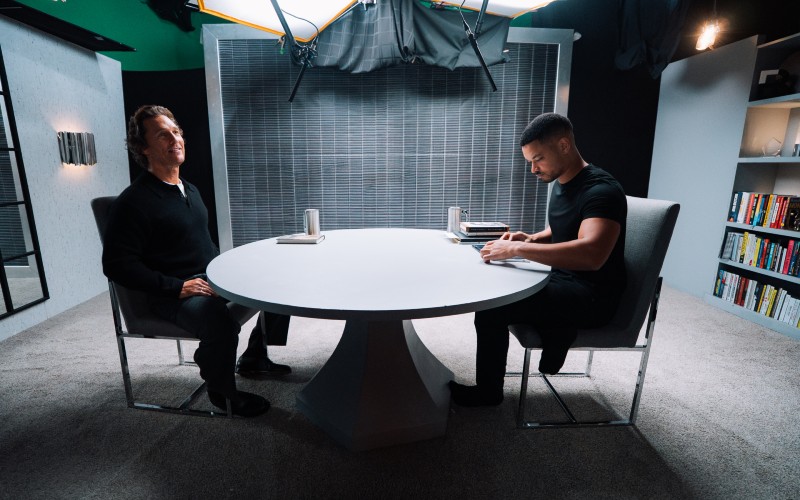
Steven Bartlett on DOAC with Matthew McConaughey
Ahead of today’s announcement, Bartlett invited me down to his London offices for an exclusive interview to lay out his vision for the future.
In took place last Tuesday in the Shoreditch offices of FlightStory and Bartlett was still buoyant from watching his beloved Manchester United beat Liverpool 48 hours earlier thanks to a goal from Harry Maguire.
Bartlett’s back story is well documented. Born in Botswana in 1992 to a Nigerian mother and an English father he grew up in Plymouth and quickly displayed an entrepreneurial flair.
Uni dropout to Dragon’ Den
At 18 he famously dropped out of Manchester Metropolitan University after one lecture and went on to launch Manchester-based social media marketing agency Social Chain in 2014 with Dominic McGregor.
Two years later, in October 2019, Social Chain merged with German-based Lumaland AG to form The Social Chain AG and within 12 months, Bartlett and McGregor had exited.
By then Bartlett was already established as the host of the Diary Of A CEO podcast, which he launched in 2017.
I’ve known Bartlett for a decade and it was obvious his departure from Social Chain was not going to be the last we heard of him.
In 2021 he became the youngest Dragon on Dragons’ Den at the age of 28.
In the run-up to today’s announcement about Steven.com – on October 21st – Bartlett resigned as a director on FlightStory Group, to be replaced by his brother Jason.
FlightStory’s studio division produces a series of hit podcasts, with the latest addition being Dr Kristen Holmes’s ‘The Line’.
Today’s announcement completes a seminal year in Bartlett’s career. As well as turning down an offer of £75m for his podcasting business he signed a deal with the world’s No.1 talent agent, WME, to represent him in the USA.
The strange thing about Bartlett is despite his high profile – he has more than 24 million social media followers – relatively little is known about the eclectic mix of interests that make up his burgeoning business empire.
Speaking ahead of today’s Steven.com announcement, he said: “The business we’re building here is called Flight. Diary Of A CEO is one such IP. Flight is the company and within Flight you have FlightStory, which is the media business, and you have Flight Fund, which really focuses on ventures.
“The overarching story is that we want to build the company that is the Disney of the creator economy, much like Disney has Mickey Mouse as its IP and build a world around Mickey Mouse. We do the same around creators. We scale their reach, their audience, their community and the value of the IP. We commercialise it.
“On the other side of the business we launch, scale and back creator ventures.
“The overarching bet is that there’s a macro shift in the world taking place where attention is increasingly shifting towards individual creators in their bedrooms with microphones.
“When that shifts, everything changes. How elections are fought and won changes. You’re seeing it now. The White House has a social media podcasting seat in the front row (of the press briefing room).
“You’re seeing what happened in the last election cycle with Kamala Harris going on Call Her Daddy and Donald Trump going on Joe Rogan.
“How businesses are built changes. Some of the leading investors in the world are actually creators who have their own funds. Everything changes when attention shifts.
Disney of the creator economy
“Flight will be the Disney of the creator economy. It will have the most lucrative, important and influential IP. It will scale that IP, it will commercialise that IP and it will build ventures adjacent to that IP. That’s what we’re doing here.”
Sharing his vision is one of the reasons why he’s invited me down to London for our first face-to-face interview since 2017.
As well as being the home of Diary Of A CEO – now the world’s second biggest interview podcast with more than 13 million YouTube subscribers – the studio also produces Davina McCall’s podcast ‘Begin Again’ and the Paul C. Brunson podcast ‘We Need To Talk’.
Bartlett is so passionate about the concept of failure and experimentation that he built a failure and experimentation team.
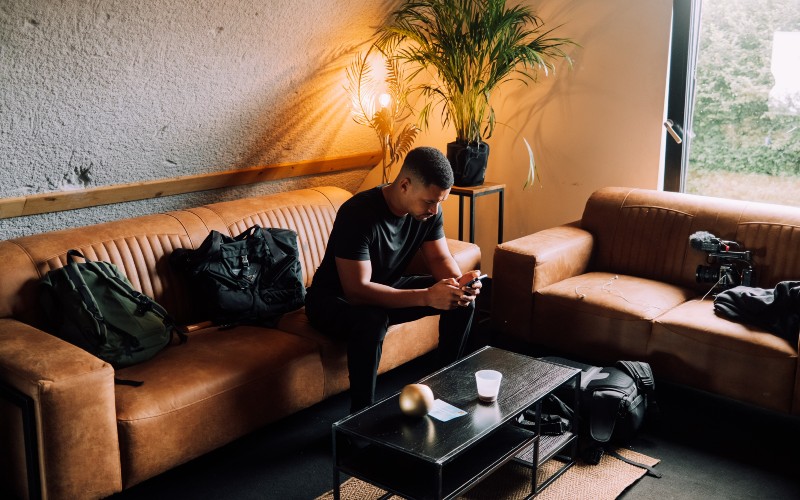
On the move: Steven Bartlett
During our tour he showed me how his latest episode of DOAC, with former Liverpool manager Jurgen Klopp, is translated into other languages to grow its global appeal.
He pulled out his phone to demonstrate how both he and Klopp appeared to be speaking in perfect Spanish thanks to the power of AI.
Junior version of DOAC
FlightStory’s innovation director, Isaac Martin, who first started working with Bartlett at Social Chain, showed me how they’re using AI to create an animated junior version of DOAC.
“The way we use AI is to bring down the cost of content production,” said Bartlett. “That’s the simple way of thinking about it. I’m entirely convinced that AI will be used across the media industry to bring down the cost of production.
“It’s a bit of a dichotomy, but we’re employing animators and video editors and production teams at alarming rates. We still can’t employ social media content creators, video editors, animators fast enough.
“I think two things can be true. I think it can be true that AI can bring down the cost of production but we’re also going to need the talent of great video editors and content creators to direct the AI to make them more efficient.
“You know the old adage that you won’t lose your job to AI but you’ll lose your job to someone using AI… that’s kind of what we’re seeing here.”
Bartlett employs more than 100 people in the UK and US and appeared to know everyone’s name.
The next stop-off in our office tour was Rox Codes. There’s a half-eaten burrito on his desk, which suggested that I wasn’t the first person to interrupt him.
Codes was over from Los Angeles for a week after joining forces with Bartlett to launch Flightcast, a video-first hosting platform.
They’ve used the tools that built DOAC and turned them into a software platform that simplifies the podcast creation process for others.
It’s one of the reasons why Bartlett is so excited about the potential to turn Steven.com into the ‘Disney of the creator economy’.
“The last thing I think about at night is business,” he admitted. “It’s hard to go to sleep when you’re so excited by everything that is going on in your professional life.
“Once I put my head on the pillow I have to try not to think about the exciting things that are happening in the business.”
Importance of sleep
Sleep is so important to Bartlett he doesn’t set an alarm clock and showed me his phone to prove he’s got nothing booked in his calendar before 11am so he can get eight hours of sleep a night.
“For me, sleep is the most important thing,” he said. “It’s upstream from everything that matters to me. It’s upstream from making good decisions to showing up as a leader.
“What you then eat is correlated to how you slept. If you’ve slept poorly you’re going to make poorer food choices. It’s a cascading effect.”
Time is a recurring theme in Bartlett’s life. One analogy he uses is to think of his day as 24 roulette chips. Eight are devoted to sleep and the remaining 16 chips are the hours available to be placed on the ‘roulette table of life’.
The feeling of time is reinforced by the sight of a sand timer in the DOAC studio.
Bartlett explained: “I like to think in terms of first principles, which has served me well. What is the fundamental game here? It’s like sleep. The first thing to control if you want to have a good day is your sleep.
“At the most fundamental level it’s the allocation of my time that is going to determine if I have a good relationship, if I’m healthy, if I’m happy etc.
“It’s not about necessarily being extremely time efficient. That’s not how I think about it. The way I think about it is being extremely intentional.”
I was allocated 30 minutes for the interview but I was actually with Bartlett for 90 minutes.
Last year he told The Guardian newspaper he’d been diagnosed with overfocused ADHD, which means he can focus on things he enjoys, but struggles with things that don’t interest him.
Perfect Ted
A good example is his relationship with Perfect Ted, which is the UK’s leading matcha brand.
He initially invested £50k in the startup when they appeared on Dragons’ Den in 2023 and quickly invested another £1m.
Today Perfect Ted occupies a floor of Bartlett’s London offices and he speaks to the founders – Marisa Poster, husband Levi Levenfiche and his brother Teddie Levenfiche – at least once a day.
“When I first invested in Perfect Ted I sat down with them and said the reason I was investing in them was not because I’m excited about getting a big return – but I do think you’ll be very successful – it’s because I’m really going to enjoy the next couple of years getting to work with you every day,” he explained.
“Even last night they came down at about 12.30am, and I was at my desk, and we talked and joked about life for 30 minutes.
“We talked about business and some personal issues. I speak to them every single day.
“Is that the best use of my time? Not necessarily – but my framework for how to allocate that time isn’t just about return on investment. It’s return on life enjoyment and I really enjoy my life with them.”
Meteoric rise
By any metric, Bartlett’s rise has been meteoric, going from starting Social Chain to joining Dragons’ Den in just seven years.
Despite the new-found fame, Bartlett insisted his life couldn’t be simpler.
“I get up in the morning, I put my black outfit on and I come here,” he said. “I’ll try and go to the gym downstairs, I see my girlfriend, I see my dog and I go to sleep. My life is pretty much like that seven days a week.
“There’s things that pop in. At one time of the year I’m going to film Dragons’ Den but even then, when I’m at Dragons’ Den, my life follows the same pattern.
“I think I live a pretty insulated and simple life in the grand scheme of public attention.
Girlfriend’s opinion
“My circle of feedback is extremely private. If my girlfriend tells me she’s unhappy with me, it ruins my day. She knows me. When she’s unhappy, she’s right.
“Sometimes I don’t like to admit that she’s right. I’ve fallen into my own little world too much in terms of my work and I’ve forgotten that I have a relationship that needs the best of me too.
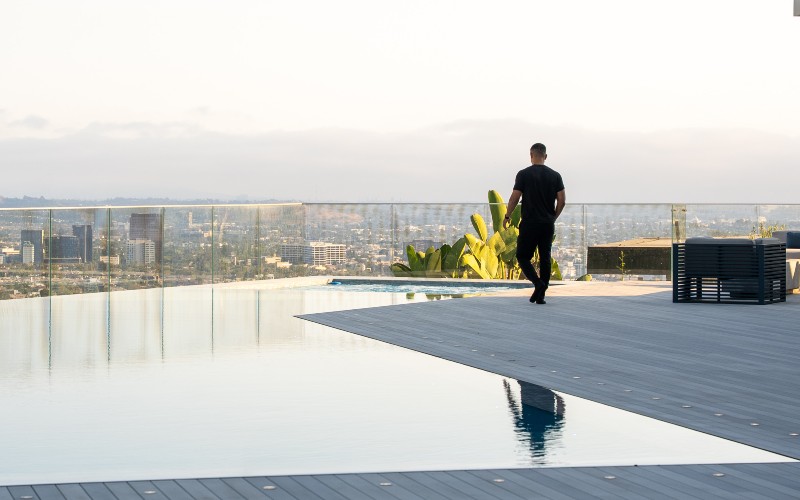
Steven Bartlett spends much of his time in the US
“The way I think about it is I’ve done something with my life that I really love.
“I love doing the podcasts, I love building businesses. There are things that come with that and you have to accept that. I don’t have any other answer.
“You accept the good, you accept the difficult. The most important thing for me, going back to first principles. Am I doing something I absolutely love every day?
“When I became a Dragon, they said you’re going to have a public profile and that’s not something you can reverse. Do you still want to go on the show and invest in entrepreneurs?
“I wouldn’t call it a warning, but they tell you how things are going to work now. You’ll be much more public.”
Last year a BBC investigation claimed guests on his Diary Of A CEO podcast were making an average of 14 harmful health claims on each episode and although not commenting directly on he story, Bartlett said criticism goes with the territory.
Criticism goes with territory
“I accept everything that comes with the job I’ve chosen to do,” he explained. “As someone who has chosen to make content on the internet you’d be pretty dumb not to expect that and ultimately accept the good stuff and the not-so-good stuff.”
At the centre of Bartlett’s empire is the Diary Of A CEO.
“We started off in 2017 but then it was just me, a microphone in the garage at the back at my bedroom,” he recalled.
“Then in the pandemic in 2020 I called Jack (Sylvester), who was a freelancer, and said: ‘I want to do this podcast and take it seriously now’.
“I took stock of my life and said ‘what would I do now irrespective of renumeration? What did I enjoy?’ The answer I had in the middle of the pandemic was ‘I really enjoyed that podcasting thing that I flirted with in 2017’.
“We started it from my kitchen in Shoreditch, which was the original DOAC set.”
There are three other identical DOAC sets, one in the company’s HQ that I visited and two in the US.
Bartlett is surprisingly candid in his assessment of his hosting skills at the start.
I was a sh*t interviewer
“I look back on my performance in my early episodes (of DOAC) and I can’t believe how terrible I was as an interviewer,” he said.
“I watched one the other day. It must have been episode 13 or 14 and I could not believe that nobody told me how sh*t of an interviewer I was. I might as well have asked the guy what his favourite colour was. It was so embarrassing.
“It just goes to show that progress is not evident in the moment. You don’t realise you’re progressing at something.”
One of the reasons for DOAC’s success can be traced back to its decision to go video-first, enabling it to take advantage of YouTube.
Bartlett recalled: “I’ve used this term a lot but the first principle questions for us were: Where are the audience? Who is the audience? What is the audience’s behaviour? For me the younger Gen Z audience were moving to short form video platforms.
“When we started the podcast business FlightStory we were very focused on being video-first because we thought that made sense.
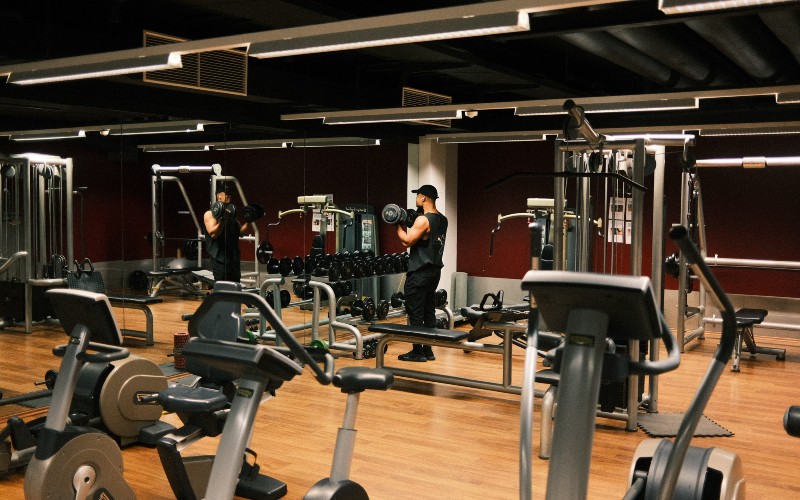
Pumping iron: Steven Bartlett tries to get in the gym every day
“We also saw that video was one of the fastest growing mediums across all of the big platforms like LinkedIn, YouTube, Instagram and now TikTok as well.
“We went video-first. We didn’t realise there was another way. This is one of the great privileges of naivety – and it was also the privilege of naivety back in the days of Social Chain was we didn’t know the rules. In hindsight that was a pivotal moment.”
DOAC has now clocked up more than 500 episodes but Bartlett refuses to rest on his laurels.
“I want to interview Barack Obama,” he said. “Funnily enough one of my favourite interviews was Ryan Chesky, CEO of Airbnb, and I’d like to reinterview him. He’s an exceptional entrepreneur.
“I want to interview Reed Hastings, of Netflix. I’ve just interviewed Michelle Obama. She used to be top of my list. I’ve got Kamala Harris coming in tomorrow.”
Musk and Trump on DOAC?
Bartlett previously identified Elon Musk as someone he wanted to interview but now he’s not so sure, perhaps recognising that everything he says can be turned into a story.
“I’d like to understand if Elon is happy or not,” he said. “I’ve heard him say publicly that he’s wasn’t happy and that you wouldn’t want to be in his head – and I’d like him to elaborate on that.”
Sam Wall: Pressure grows on LinkedIn to close stalker’s account
Bartlett is similarly non-committal to my question about whether he’d want to interview President Trump.
“I’d have to do some research to figure out whether I felt it was going to align with our audience,” he said diplomatically.
Despite being a huge advocate of AI, Bartlett has voiced concerns about the technology.
In a hot tub with Lord Sugar
Earlier this year he was the subject of an AI deepfake sponsored Instagram ad showing him in a hot tub with Lord Sugar, smoking a cigar and drinking whisky.
For the record, Bartlett neither drinks or smokes. “I can confirm I’ve not shared a hot tub with Lord Sugar – yet,” joked Bartlett.
“AI is like all new technologies and innovations. There are upsides and downsides and it all really depends on the application of the technology.
“Great things have been made possible by the internet, great discoveries, sharing of information but also a lot of bad things. AI is the same.
“I’m going to be completely honest, I’m extremely concerned by the unintended consequences that might emerge from AI.
“I sit there with these experts from all around the world and I ask them these questions about the unintended consequences.
“What happens in a world where there’s an apparently sentient being that has IQ multiples higher than any of us? How do we have confidence that that the sentient being will be benevolent?
“I’ve not found answers to this and I’ve probably interviewed 10 of the leading experts on AI and none of them have given me an answer that makes me feel peaceful. That’s the biggest question I have.”
Bartlett references his long-term girlfriend, Melanie Vaz Lopes, a lot during our interview and she’s clearly in his thoughts when he answers the following two questions.
Asked about his regrets he said: “It’s an ongoing regret that I will, in the future – and I get this from the palliative nurses who have interviewed people of their death beds – that I will look back and think I’ve misprioritised the allocation of my time: I’ve spent too much of my time working and could have spent more time with my loved ones. I think about this a lot.”
This prompted my next question. “What’s the future of Steven Bartlett?” I asked.
‘I dream of becoming a dad’
“One of primary objectives is to be a dad,” he admitted. “I want to have a big family. I want to have four or five kids.
“Professionally I want to continue to work with people who I love every day doing things that obsess me and possess me.
“We will build the Disney of the creator economy. There’s no doubt in my mind about that – it’s just about timeframes. It’s about when we hit certain milestones.
“Lastly, I’m increasingly more interested in paying forward the information that I have, specifically for people like me when I was young.
“Specifically for people who come from minority backgrounds who don’t have the same privileges as everybody else. I think about this a lot now.”
One thing he doesn’t think about is his legacy.
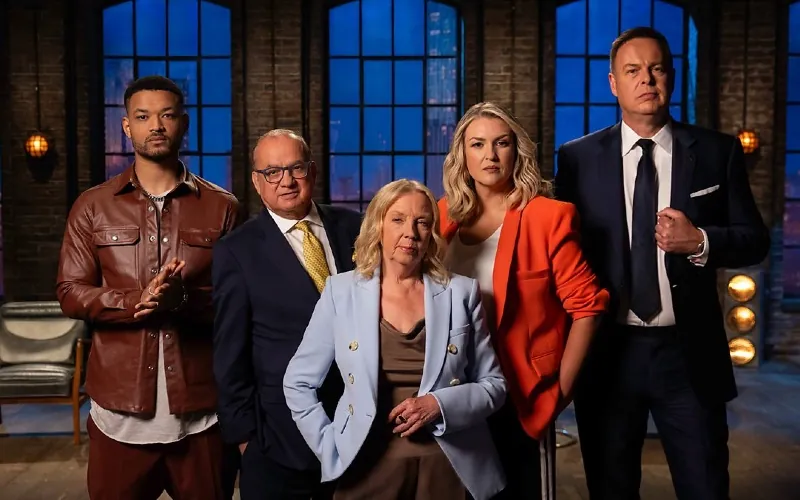
Fire: Steven Bartlett became the youngest Dragon on Dragons’ Den at the age of 28
“I’m going to be 100 per cent honest: I don’t think about it. Maybe it’s because I don’t have kids yet. I care about that as much as the weather today. It doesn’t cross my mind.”
I ended our interview with the killer question.
Strictly or I’m A Celebrity?
“Would you ever go on Strictly Come Dancing?” I asked.
Bartlett paused for a second before answering.
“I can give you a very short answer with 100 per cent certainty,” he said. “I will never be in the jungle and I will never be on Strictly.”
- Chris Maguire can be contacted at Chris.Maguire@businesscloud.co.uk.

